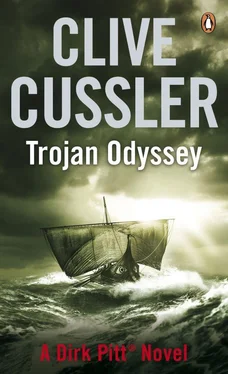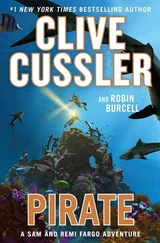The gargantuan proportions of the tunnel network became even more spectacular when Pitt and Giordino in stunned disbelief forced themselves to accept the fact that there was not one but four immense interconnected tunnels of equal size.
Giordino didn't astound easily, but he was shamelessly overwhelmed. "This can't be real," he said, in a voice barely above a whisper.
Carefully, Pitt steeled himself, shutting out all inclinations to fog his mind from the impact and blind his concentration. There had to be an explanation for the Herculean undertaking. How was it possible that Specter had built four massive tunnels under the mountains of Nicaragua without exposure by international intelligence or the media? How could such a vast project have gone unnoticed for more than four years?
"How many railroads does Specter intend to operate?" Giordino muttered dazedly.
"These tunnels weren't built to run cargo across the land by rail," Pitt mused.
"Barge transportation, maybe?"
"Not cost-efficient. There has to be another objective behind it all."
"There has to be a colossal bonanza at the end of the rainbow for such an expensive undertaking."
"The cost must have easily run more than the estimated seven billion."
Their voices reverberated up and down the cavernous tunnel that was completely empty of men and vehicles. If not for the perfectly arched walls and roof and the smooth concrete surface, they could have imagined themselves in an immense natural grotto.
Pitt tilted his head down at the floor of the tunnel. "So much for a rapid transit cargo system. They removed the railroad tracks."
Giordino nodded discreetly at a security camera mounted on a post that was aimed directly at them. "We'd better beat a hasty retreat back to the main tunnel and find another means of transportation. This cart is too conspicuous."
"Good thinking," said Pitt. "If they haven't figured out that they have unwelcome intruders by now, they must be brain-dead."
They retraced their journey through the three empty tunnels, stopping just short of the fourth, where they had started. They parked the golf cart in the crosscut tunnel beyond a security camera and nonchalantly walked down the roadway until they reached a stop where eight other miners were standing around waiting for the bus. Close up and through their sunglasses, Pitt could see their eyes. They were all Asian.
Pitt nudged Giordino, who got the message.
"Ten will get you twenty, they're Red Chinese," whispered Pitt.
"I won't take the bet."
No sooner had the double-decker bus arrived than a fleet of carts with red and yellow lights flashing sped past and into the crosscut tunnel they'd just deserted.
"Once they find the cart, it will take them all of ten seconds to know we're on this bus," said Giordino.
Pitt's eyes were on a train that was approaching from the east sector of the tunnel. "My thoughts exactly." He held up a hand and motioned for the bus driver to continue after the waiting miners had boarded. The door closed with a hiss and the bus moved on.
"When was the last time you chased a freight train?" Pitt asked Giordino, as they hurried across the road and stood talking in detachment as the locomotive passed by, the engineer inside the cab reading a magazine.
"Several years ago in the Sahara Desert, the train carrying toxic chemicals to Fort Foureau."
"As I remember, you almost fell off."
"I hate it when you make sport of me," said Giordino, with a downward twist of his lips.
The instant the locomotive passed by, they sprinted along the track. Pitt had already clocked the train's speed at twenty miles an hour, and they judged their running speed accordingly. Giordino was fast for his size. He put his head down and charged after a flatbed car as if he was carrying a football toward the end zone. He grabbed the hand ladder as it passed, held on and was literally swept onto the car. Pitt also used the momentum of the train to swing himself aboard.
The flatbed car was loaded with two pickup trucks of unknown origin powered by an electrical motor. Shiny new, they looked to be fresh off the boat. Without a word between them, Pitt and Giordino threw open a door and slipped into one of the truck's cabs, crouching down below the windows and the dashboard. Their timing couldn't have been more perfect, as two security patrol cars came screaming past the train, lights flashing as they raced after the bus.
Pitt looked pleased. "Our little maneuver was missed by the cameras or they'd have come after us instead of the bus."
"About time we had some luck."
"Stay put," instructed Pitt. "I'll be right back."
He opened the door on the side of the train away from the road and lowered himself to his hands and knees. Crawling from front to back, he removed the chocks and tie-down chains that held the pickup truck to the rail car. Then he scrambled back inside.
Giordino looked at him strangely. "I can read your mind, and I can't see how we're going to drive off a moving train into a tunnel that's blocked on both ends."
"We'll worry about it when the time comes," Pitt tossed off placidly.
There is nothing on earth that remotely resembles a big tunnel-boring machine.
The TBM that dug the tunnels under Nicaragua from the Atlantic coast to the Pacific shore stretched over one hundred and twenty yards in length, followed by another hundred yards of its equipment train.
An incredibly complicated monster that looked like the first stage of a Saturn rocket, it was driven by an electric variable-speed drive that eliminated any hydraulic oil leakage and pollution. The Specter TBM fractured flakes of bedrock by the continuous rotation of a series of carbide cutters mounted on a massive steel cutter head that could cut a circular tube through hard rock fifty-two feet in diameter at the rate of one hundred and fifty feet a day. The body that enclosed the cutter head also contained the drive motors that provided the enormous power it took to thrust the cutter's teeth into the rock, and the hydraulic presses that exerted the immense pressure it took to force the TBM into solid wall and grind away the rock.
The giant machine was articulated, and its operator, who was positioned at the front of the machine, could automatically steer it with the use of a laser while he monitored the operation. The excavated muck was transported to the rear section of the TBM and passed through a rock crusher that mashed the rock into fine sand. From there, the conveyor belt carried it back toward the opposite end of the tunnel, where it was pumped out into the sea.
The train stopped two hundred yards behind the TBM and beneath the overhead conveyor to unload at a supply depot and terminal. A series of large freight elevators ran out of sight through the roof of the tunnel. A group of women in white jumpsuits exited one of the elevators and climbed into a bus. Pitt angled close to them and overheard one woman say the inspection had to be finished in eight hours so a report-could be sent to company headquarters above.
It made no sense to Pitt. Headquarters? Where above?
No one seemed to mind as he casually drove the truck from the flatbed onto the loading dock and down a ramp to the concrete road. Then he pulled over and stopped behind a row of three other electric trucks.
Giordino looked around the busy area, where at least thirty miners were engaged in operating the mass of machinery. "That was too easy."
"We're not home yet," said Pitt. "We've got to find a way out of here."
"We could always climb out through another ventilator."
"Not if we're under Lake Nicaragua."
"How about the one we came from?"
"I think we can safely forget that plan."
Giordino was absorbed, watching the operation of the big TBM. "Okay, mastermind, what's your next scenario?"
Читать дальше












